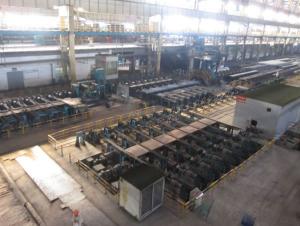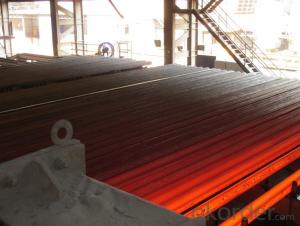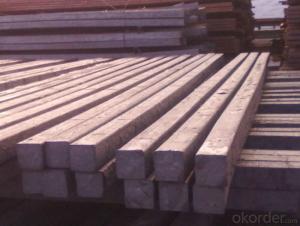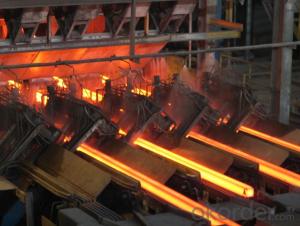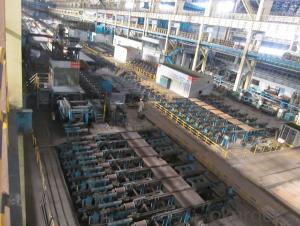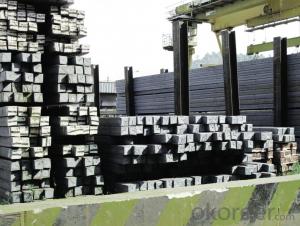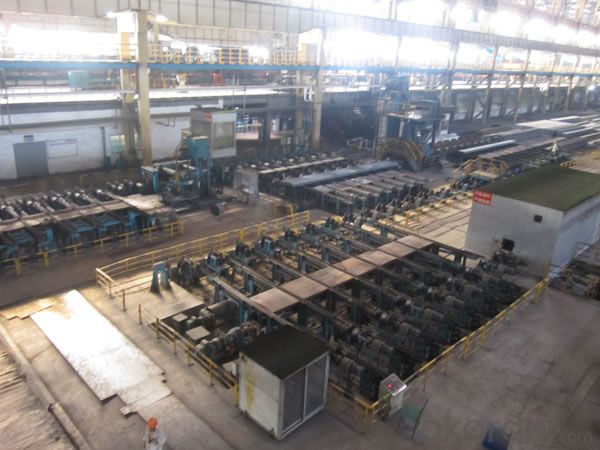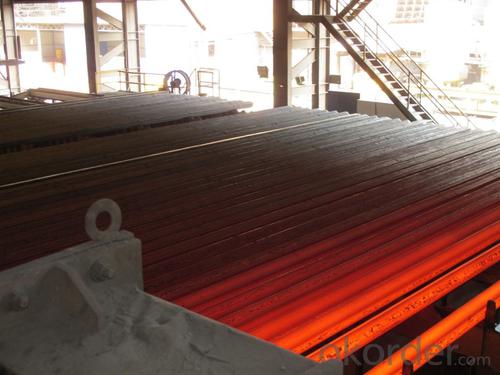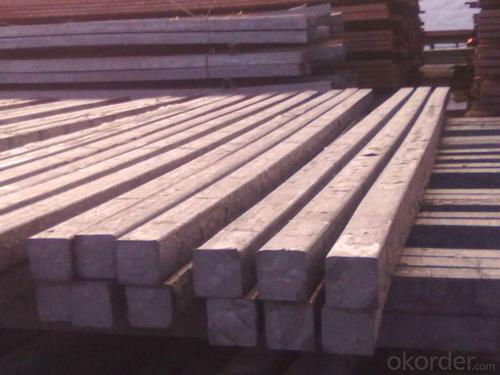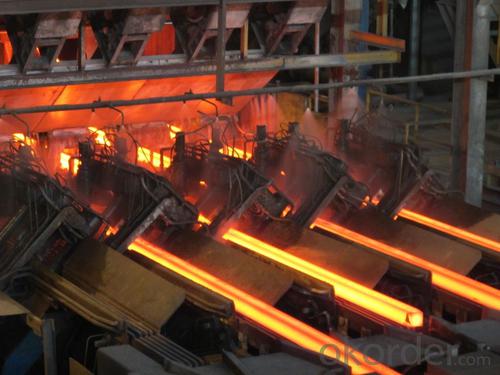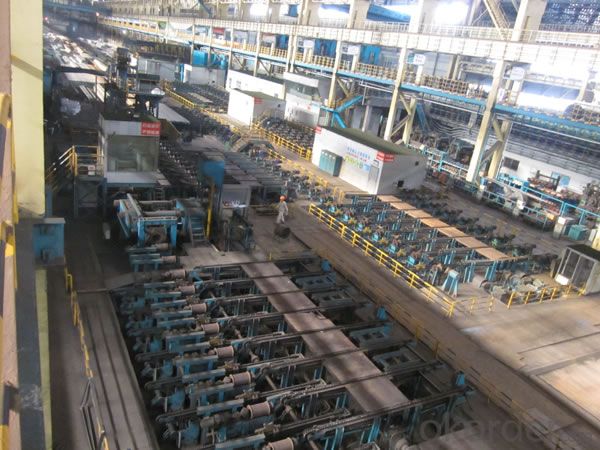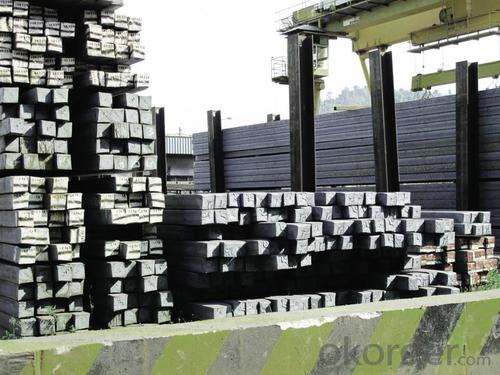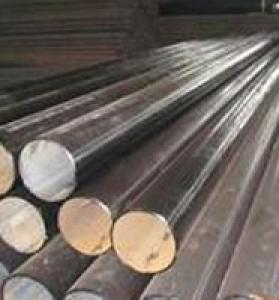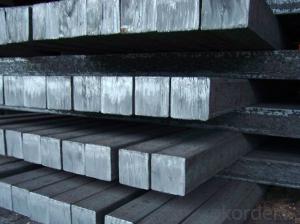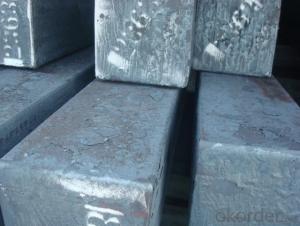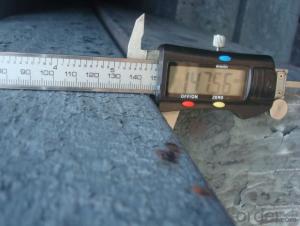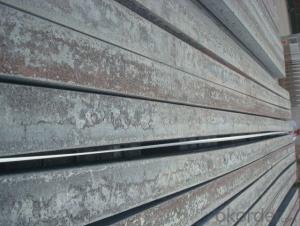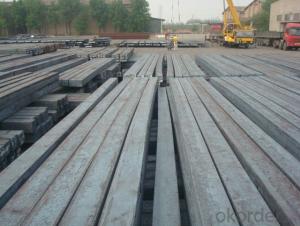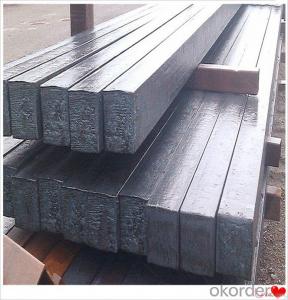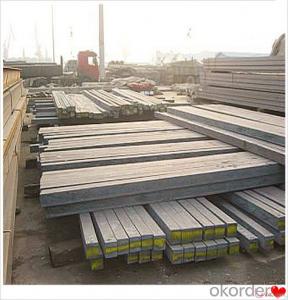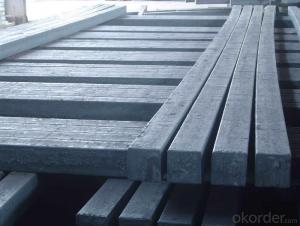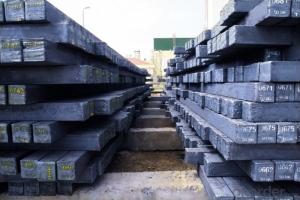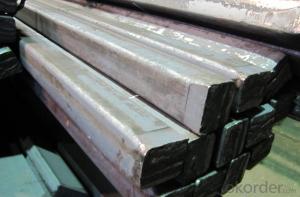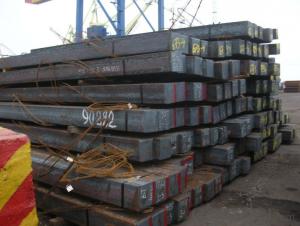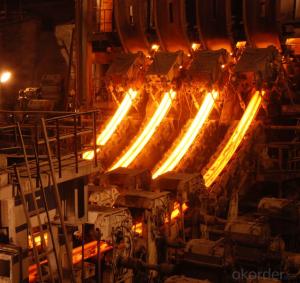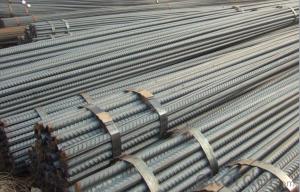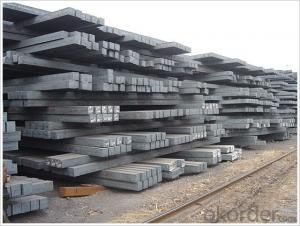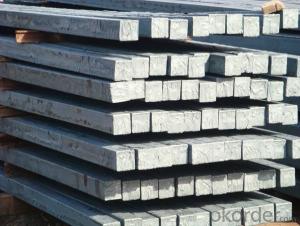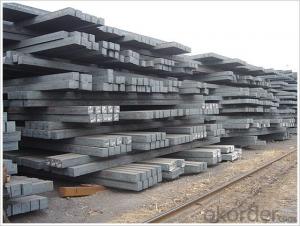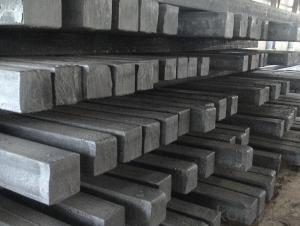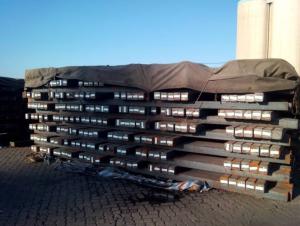Square Steel Billet Q235 3SP Grade Prime Quality 10#
- Loading Port:
- Tianjin
- Payment Terms:
- TT OR LC
- Min Order Qty:
- 2000 m.t
- Supply Capability:
- 50000 m.t/month
OKorder Service Pledge
OKorder Financial Service
You Might Also Like
Description of Square Steel Billet Q235 3SP Grade Prime Quality 10#
M. S. Billets are used for rolling of TMT Re-Bars of Fe415 and Fe500 Grade and various other structural steel products.
CRS Billets are used for rolling of CRS TMT Re-Bars.
Special Alloy Billets are used for rolling of any special grade TMT Re-Bars like Earthquake resistant TMT Re-Bars and for special grade structural steel products.
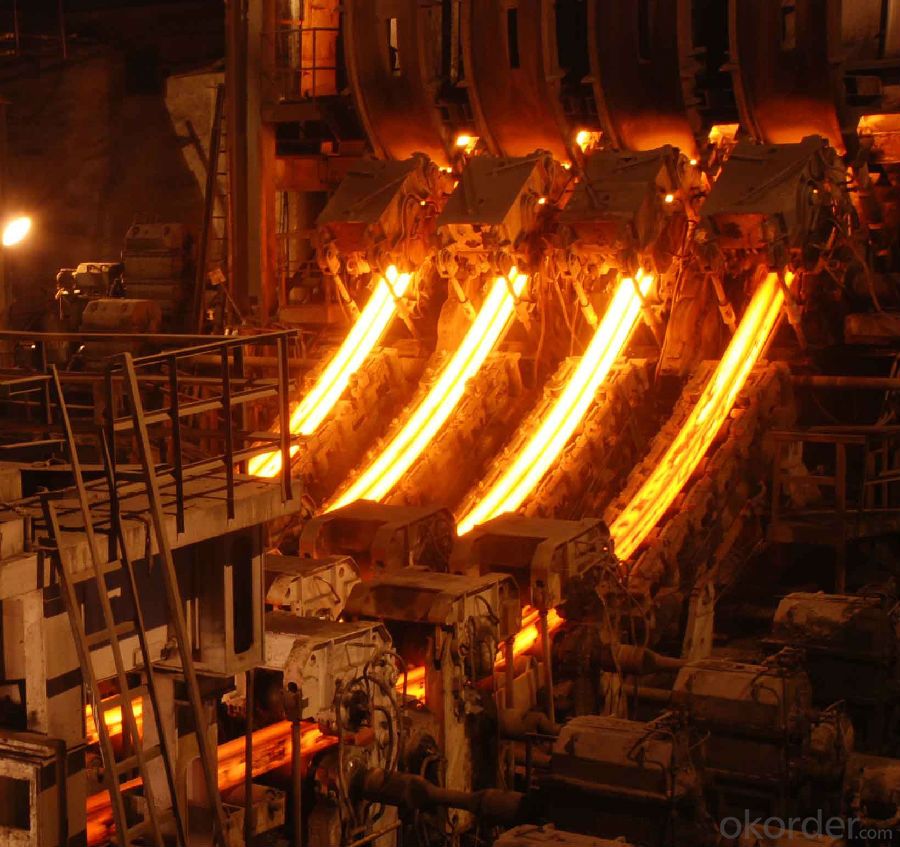
Main Feature Square Steel Billet Q235 3SP Grade Prime Quality 10#
Raw elements(C,Fe,Ni,Mn,Cr,Cu.)---Smelted ingots by AOD finery---hot rolled into black suface---pickling in acid liquid---cold drawn----polished by automatically machine--- cutting into pieces---checking quanlity
Applications of Square Steel Billet Q235 3SP Grade Prime Quality 10#
Widely Used in the areas such as Stainless Steel Fasteners, Chains, Kitchen and Sanitary wares, Furniture handles, Handrails, Electroplating and Electrolyzing pendants, Foods, Electron, Petroleum, Construction and Decoration, etc. Products have a high strength after cold-working. Electronic products parts, Medical appliance, Springs, Bus Inside and Outside packaging and building, Street Lamp Posts, etc. Decoration materials and Outdoor Publicity Billboard. Used for the products which have the Anti-Stress Corrosion requirement. Electron Products, Table-wares, Bolts, Nuts, Screen Meshes, Cumbustors and so on.
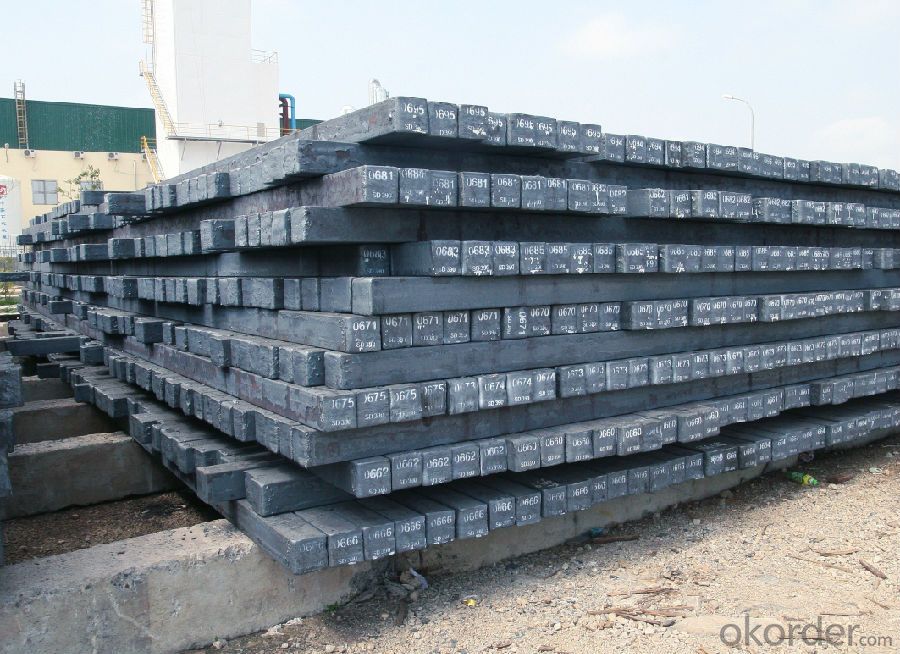
Specifications of Square Steel Billet Q235 3SP Grade Prime Quality 10#
| Standard | C(%) | Mn(%) | S(%) | P(%) | Si(%) |
| Q195 | ≤0.12 | ≤0.50 | ≤0.040 | ≤0.035 | ≤0.30 |
| Q235 | ≤0.20 | ≤1.40 | ≤0.045 | ≤0.045 | ≤0.35 |
| Q275 | ≤0.22 | ≤1.50 | ≤0.045 | ≤0.045 | ≤0.35 |
| 20MnSi | 0.17-0.25 | 1.2-1.6 | ≤ 0.050 | ≤ 0.050 | 0.40-0.80 |
| 3SP | 0.14-0.22 | 0.40-0.85 | ≤ 0.050 | ≤ 0.040 | 0.05-0.15 |
| 5SP | 0.28-0.37 | 0.50-1.00 | ≤ 0.050 | ≤ 0.040 | 0.15-0.30 |
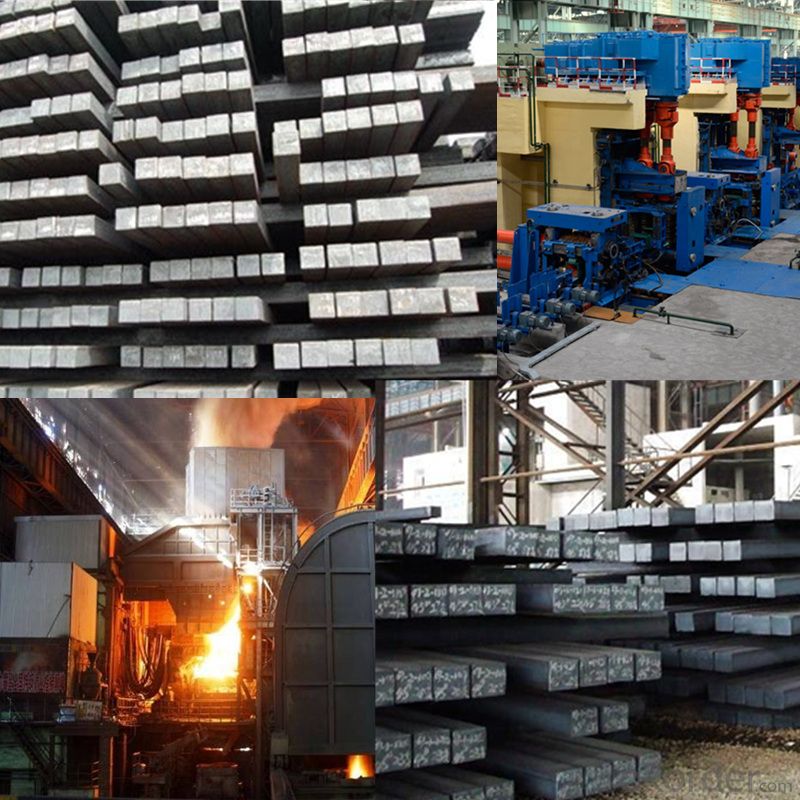
FAQ of Square Steel Billet Q235 3SP Grade Prime Quality 10#
We have organized several common questions for our clients,may help you sincerely:
1. How Can I Visit There?
Our company is located in Tianjin City, China, near Beijing. You can fly to Tianjin Airport Directly. All our clients, from home or aboard, are warmly welcome to visit us!
2. How Can I Get Some Sample?
We are honored to offer you sample.
3. Why choose CNBM?
Our delivery time about 15-20days for standard sizes, if you have other requirements like hardness, quanity and width ,it is about 20-40days. But don't worry we also try our best for the delivery time ,because time longer and our cost is higher.
- Q: How do steel billets contribute to the overall vibration resistance of a product?
- Steel billets are an essential component in enhancing the overall vibration resistance of a product. The high-strength properties of steel make it an ideal material for reducing vibrations and improving product stability. Steel billets are typically used as a raw material in the manufacturing process, where they are further processed into various shapes and forms. The dense and uniform structure of steel billets allows them to absorb and dissipate vibration energy effectively. When integrated into a product, steel billets provide additional mass, which helps dampen vibrations by absorbing and distributing the energy throughout the structure. This mass acts as a stabilizing force, preventing excessive movement and reducing the amplitude of vibrations. Moreover, steel billets possess excellent mechanical properties, such as high tensile strength and stiffness, which contribute to the overall vibration resistance of a product. These properties enable steel billets to withstand dynamic forces and resist deformation under vibration, ensuring the structural integrity of the product. Additionally, steel billets can be engineered to have specific geometries and cross-sectional shapes that further enhance their vibration resistance. For example, the use of round or square billets with smooth surfaces minimizes stress concentration points and reduces the risk of fatigue failure. By optimizing the design and dimensions of steel billets, manufacturers can tailor the vibration resistance of a product to meet specific requirements. In summary, steel billets play a crucial role in improving the overall vibration resistance of a product. Their high mass, dense structure, and superior mechanical properties enable them to absorb and dissipate vibration energy, stabilize the product, and enhance its structural integrity. By utilizing steel billets in the manufacturing process, manufacturers can ensure that their products are more resistant to vibrations, leading to improved performance and longevity.
- Q: What is the cost of a steel billet?
- The cost of a steel billet can vary depending on several factors such as the size, grade, and market conditions. Steel billets are semi-finished products that serve as raw material for various steel products. The price of a steel billet is typically quoted per metric ton. To determine the cost, one must consider the current market price of steel, which can fluctuate due to factors like supply and demand, international trade policies, and global economic conditions. Additionally, the grade of steel billet can impact the cost as different grades have varying levels of purity and specifications. It is essential to reach out to steel suppliers or consult market reports to get accurate and up-to-date information on the cost of steel billets. Additionally, other factors such as transportation and handling costs may also influence the final price.
- Q: Are there any international standards for steel billets?
- Yes, there are international standards for steel billets. The International Organization for Standardization (ISO) has developed several standards that define the requirements and specifications for steel billets. The most commonly used ISO standard for steel billets is ISO 683-2, which specifies the technical delivery requirements for hot-rolled steel bars, sections, and billets for general engineering purposes. Additionally, the American Society for Testing and Materials (ASTM) has also developed standards for steel billets, such as ASTM A615/A615M, which specifies the requirements for deformed and plain carbon-steel bars for concrete reinforcement. These international standards ensure that steel billets produced and traded globally meet the necessary quality and performance criteria, promoting consistency and compatibility in the industry.
- Q: What are the common defects in steel billets during hot rolling?
- Certain defects may be experienced by steel billets during hot rolling, which could potentially impact the quality of the final product. Some commonly encountered defects include: 1. Longitudinal surface cracks: These cracks appear on the surface of the billet and may occur due to inadequate cooling, high rolling temperatures, or inferior steel quality. Surface cracks can compromise the structural integrity and performance of the product. 2. Internal cracks: These cracks are found within the billet, away from the surface. They can be caused by insufficient billet heating, uneven temperature distribution, or improper rolling parameters. Internal cracks may lead to material failure or inconsistencies in the final product's dimensions. 3. Surface defects: These defects encompass scales, pits, or scars on the surface of the billet. They are often a consequence of subpar billet preparation, inadequate scale removal, or improper rolling techniques. Surface defects can impact the appearance and surface quality of the final product. 4. Lamination: Lamination defects manifest when there are layers or separations within the billet. They can be caused by impurities in the steel, improper billet preparation, or inadequate rolling parameters. Laminations can result in diminished mechanical properties and compromised structural integrity of the final product. 5. Warping: Warping defects occur when the billet experiences uneven cooling or excessive rolling tensions. This can cause distortion or bending of the billet, leading to inconsistencies in the final product's dimensions. 6. Inclusions: Inclusions refer to non-metallic particles or impurities that become trapped within the steel during the billet formation process. They can lead to reduced mechanical properties, surface defects, or material failure in the final product. To mitigate these defects, it is crucial to exercise proper control over rolling parameters, billet preparation, and cooling processes. Regular inspections and the implementation of quality control measures should be employed to detect and address any defects that may arise during hot rolling.
- Q: What are the safety precautions to be taken while handling steel billets?
- Some safety precautions to be taken while handling steel billets include wearing appropriate personal protective equipment (PPE) such as gloves, safety goggles, and steel-toed boots to protect against potential injuries. It is important to ensure proper lifting techniques are used, utilizing mechanical aids if necessary, to avoid strains or back injuries. Additionally, maintaining a clean and organized work area can help minimize tripping hazards and potential accidents. Regular inspection and maintenance of equipment, such as cranes and forklifts, is essential to ensure safe handling of the steel billets.
- Q: How do steel billets contribute to the overall sustainability of a structure?
- Steel billets contribute to the overall sustainability of a structure in several ways. Firstly, steel is a highly durable and long-lasting material, ensuring the longevity of the structure and reducing the need for frequent repairs or replacements. Additionally, steel is a recyclable material, meaning that steel billets can be melted down and reused in the production of new steel, reducing the demand for virgin materials and the energy required for their extraction and processing. Furthermore, steel has a high strength-to-weight ratio, allowing for lighter and more efficient structures that require fewer materials, resulting in reduced resource consumption and lower carbon emissions throughout the lifecycle of the structure. Overall, the use of steel billets in construction promotes sustainability by optimizing resource efficiency, minimizing waste, and extending the lifespan of structures.
- Q: Can steel billets be welded together?
- Yes, steel billets can be welded together. Welding is a common method used to join steel billets by heating the surfaces to a molten state and then allowing them to cool and solidify, resulting in a strong and continuous joint.
- Q: What is the role of steel billets in the manufacturing of automotive frames?
- The manufacturing of automotive frames heavily relies on steel billets, which fulfill a crucial role. These billets are essentially semi-finished steel products utilized as raw material across various industrial processes. In the automotive sector, steel billets undergo a series of manufacturing steps to become automotive frames. Primarily, steel billets are chosen for their exceptional strength and durability. Their composition and mechanical properties make them ideal for supporting the weight and structural integrity of automotive frames. These frames need to endure diverse loads, shocks, and vibrations, which is where steel billets provide the necessary strength and stability. The manufacturing process commences with heating the steel billets to a specific temperature known as the forging temperature. At this temperature, the billets become pliable and can be easily shaped and manipulated. Subsequently, they are introduced into a forging press or machine, where immense pressure is employed to mold them into the desired shape of the automotive frame. Following the forging process, the frames commonly undergo heat treatment to enhance their mechanical properties and performance. This process involves heating the frames to a specific temperature and then rapidly or gradually cooling them to achieve the desired hardness, strength, and toughness. Heat treatment also aids in relieving internal stresses and enhancing the overall structural integrity of the automotive frames. Once the frames are forged and heat-treated, they go through various finishing processes, such as machining, welding, and surface treatment. Machining is executed to eliminate excess material and refine the frame's dimensions, ensuring precise specifications are met. Welding is employed to join different components of the frame together, guaranteeing their structural integrity. Additionally, surface treatments like painting or galvanizing are administered to safeguard the frames from corrosion and enhance their appearance. In summary, the indispensability of steel billets in the manufacturing of automotive frames arises from their remarkable strength, durability, and malleability. They serve as the foundation for creating robust and dependable structures capable of withstanding the demands of the automotive industry. Through processes such as forging, heat treatment, and finishing, steel billets are transformed into automotive frames that constitute the backbone of vehicles, ensuring their safety and performance on the road.
- Q: What is the role of steel billets in the manufacturing of machinery?
- Steel billets play a crucial role in the manufacturing of machinery due to their versatile nature and desirable properties. These semi-finished steel products are essentially long, rectangular bars that serve as the raw material for producing various machinery components. Firstly, steel billets are known for their strength, durability, and excellent mechanical properties, making them ideal for the construction of heavy-duty machinery. By using high-quality billets, manufacturers can ensure that the resulting machinery will have the strength and structural integrity necessary to withstand the demanding operating conditions and loads. Secondly, steel billets can be easily molded and shaped into different forms and sizes through various manufacturing processes like forging, rolling, or extrusion. This versatility allows machinery manufacturers to create complex components with intricate designs, ensuring precision and functionality. Furthermore, the uniformity and consistency of steel billets contribute to the reliability and performance of machinery. As billets undergo a controlled cooling process during their production, they acquire a uniform microstructure, minimizing the risk of defects and improving the overall quality of the machinery components manufactured from them. Another important aspect is the machinability of steel billets, which refers to their ability to be easily cut, drilled, or shaped using machine tools. This property allows manufacturers to efficiently produce machinery components with precise dimensions and tolerances, saving time and costs in the manufacturing process. Moreover, steel billets can be heat-treated to enhance their mechanical properties, such as hardness, toughness, and resistance to wear or corrosion. This makes them suitable for critical machinery parts that require specific characteristics to ensure optimal performance and longevity. In summary, steel billets are indispensable in the manufacturing of machinery due to their strength, versatility, uniformity, and machinability. They provide the necessary raw material for producing robust and reliable machinery components that can withstand demanding conditions and meet the performance requirements of various industries.
- Q: How are steel billets used in the manufacturing of rail tracks?
- Steel billets are an essential component in the manufacturing of rail tracks. A billet is a semi-finished piece of steel that is commonly used as a starting material in various metalworking processes. In the case of rail track manufacturing, steel billets are first heated to a high temperature and then passed through a series of rolling mills. During the rolling process, the steel billets are gradually shaped and elongated to form long, narrow sections known as rail blooms. These rail blooms are then further processed and shaped through hot rolling, where they are passed through multiple sets of rollers to achieve the desired dimensions and shape of the rail track. This process helps in improving the mechanical properties of the steel, such as its strength and durability. Once the rail blooms are shaped, they undergo a process called controlled cooling, where they are cooled at a specific rate to optimize their microstructure and properties. This controlled cooling helps in reducing internal stresses and improving the overall quality of the rail tracks. After the controlled cooling process, the rail blooms are further processed through straightening, cutting, and finally, finishing operations. These operations ensure that the rail tracks are straight, have precise dimensions, and meet the required standards and specifications. In summary, steel billets play a crucial role in the manufacturing of rail tracks. They are transformed into rail blooms through a series of rolling processes, and then further processed to produce high-quality rail tracks that are strong, durable, and able to withstand the heavy loads and constant use of railway transportation systems.
Send your message to us
Square Steel Billet Q235 3SP Grade Prime Quality 10#
- Loading Port:
- Tianjin
- Payment Terms:
- TT OR LC
- Min Order Qty:
- 2000 m.t
- Supply Capability:
- 50000 m.t/month
OKorder Service Pledge
OKorder Financial Service
Similar products
Hot products
Hot Searches
Related keywords
